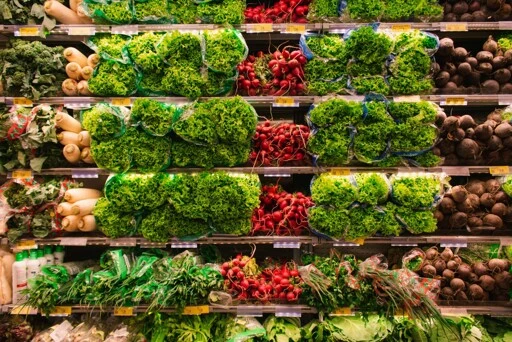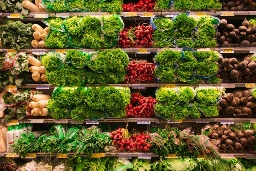Food too expensive? It’s time for public grocery stores
Food too expensive? It’s time for public grocery stores

Food too expensive? It’s time for public grocery stores

Food too expensive? It’s time for public grocery stores

Food too expensive? It’s time for public grocery stores

Who's afraid of a little competition?
Landlords, mostly.
Galen Weston
It's tough. Co-ops I've checked out are all about organic, which is cool but they're more expensive. I've looked at farm stands and Saturday markets but they're are more expensive too.
Not to mention that a farmer's market vendors can just lie about the origin of their products.
I think people have to realize that capitalism has made us search for cheap over quality and nutrition when it comes to food.
Food is literally one of two things that keep us alive and thriving yet we balk at food that is slightly more expensive but much more nutritious, lasts much longer and requires less volume to feed one's self due to this nutrient density vs. Commercially grown food, that has been transported thousands of kilometers to your local store.
You can't afford the increase in price to buy quality food? That has nothing to do with the food, what or costs or what you should be buying or eating. It's capitalism keeping you part of the slave class and making you think grocery store prices are normal.
They have the same nutrients as commercially grown. They have a higher density because theyre smaller and have way lower production. The neutrient declaine is going to happen regardless of you using high or low yield it just a matter of scale and time. All of this started exactly how you believe we should be doing it now. The problem is that doesnt make enough food for everyone and it only takes one bad year and a LOT of people dont get anything. So we selected for traits to stop that. The problem is that now we have to choose more land and resources (fertilizer and energy) to maintain heirloom strains and grow them at scale and transport them around faster and farther than theyre designed to last. Or less quality per yield but far more yield and much longer sheld life. Without forcing everyone to live within a certain radius of an heirloom farm there is only so much you can do before logistics and shelf life simply dont cut it anymore.
I have found that my local co-op has some great prices for some items and others that are more expensive but it depends on what I need to purchase. Their bulk teas are such a good deal and really the only place I can buy bulk teas. Their bulk goods are a good deal as well. Some of the fruit and vegetables are a good deal unless its not in season. Their bread (freshly made from a local bakery) tastes amazing and a great deal as well.
That being said I don't love their meat selection (smaller selection, more expensive but has a few gems), nor do I like to buy their boxed standard goods. Broths, snacks, canned goods or anything like that is more expensive and doesn't seem worth it for the quality difference. The key is to find a few anchors that get you there. I don't go as often to my co-op compared to my local trader joes.
What we need are co-ops. Unfortunately it's hard to run one of those. They tend to not make so much money.
Maybe as a nation, we shouldn't be letting profits get in the way of feeding people? Just a wild suggestion.
How would this change the price?
The bloat is in the middle of the supply chain so unless these people avoid the middle man such as people who control the meat processing... There is limited impact having the retail handled by the state
in the middle? you mean the middle who also owns the start and the end supply of almost everything?
They don't own the start, the farmer does and they get fucked by the middle man too.
Essentially guy doing logistics and processing internalize all of the value within the chain via monopoly powers.
AFAIK the retail side in Canada is also making significant profits. Those could be removed or significantly reduced from the prices of a public grocery store. This would decrease prices in the short term. The oligopoly could then increase their distribution side profit margins, forcing the public stores to increase prices. This would make a very strong case for the comprehensive public solution that also tackles distribution. If you tackle just distribution, there's nothing discouraging the retail side of the oligopoly from cranking up their profit margins immediately. In effect, retail prices wouldn't increase, but the oligopolies would absorb the decreased distribution price difference. Then they'd get their politicians to say - see gov't wasted billions on this scheme and nothing changed, time to scrap the public distribution company. Ideally a public option should tackle both retail and distribution in one go in order to realize lower prices curbing the oligopoly's ability to prevent that via the distribution or retail sides.
E: I guess the oligopoly could instantly increase distribution margins in the first scenario too. Independent grocers would probably scream, but I don't know if that would be a significant impediment. I think it would be more difficult for the oligopoly to instantly stop any price decrease due to retail profit elimination, but I'm not certain lower prices would hold long enough for the public to take notice and oppose the inevitable calls for dismantling public distribution. So yeah, a public option would most likely have to have public distribution to succeed.
Seriously. Owning the logistics and distribution would do more, probably. And even then not for everything. You have to assume for anything manufactured the cost would get shifted around.
Frankly, the biggest difference I see around me is living in a place where the producers get direct access to customers AND where foot traffic is king. I've gone back and forth from rural to urban living spaces and here in the rural area I am now the big game changer is you walk up to a market and buy from fishmongers that bought fresh fish directly at auction and grocers that got a lot of the produce directly from the producer/farmer. And then there's enough people around in a small enough space that you can go to a supermarket for the packaged product and to a market/grocer for the fresh or specialty product.
The model where people drive to a shop and expect to find everything in the same place is a nightmare for pricing on both ends of things.
Ever heard of a co-op? They usually deal directly with the providers. No middlemen.
I've worked with co-ops both on the retail grocery side and ag aggregator side, and the traditional supply chain is similar. The ag co-ops serve as a middleman, and the retail grocery will usually deal with a distributor.
The grocery co-op had way more direct accounts (hundreds) than a traditional grocery, but that was mostly for smaller company specialty goods. The vast majority of the product moving off the shelves was bought from one of two big distributors.
Farmers markets?
Lol... That's a place where affluent people feel "authentic"
They are hardly cheap and that's the point
Modern farmers market is yuppie exercise
That’s not the case everywhere, sucks to live In a sucky place, don’t project your issues on the rest of world. The farmers markets in Canada are farmer selling their produce, it’s cheaper than big box stores, and they take all the profit themselves other than rent for a stall.
How do they work in your country?
Honestly where I live, farmers markets are often the same price, sometimes a bit more and actually sometimes a bit less than a lot of grocery stores. All our groceries have to be shipped on a boat so it actually often is cheaper to grow and buy local.
Either way I prefer to give my money to the "yuppies" than to fuckhead billionaires like Galen Weston and Jim Pattison. I acknowledge that's a privelege but I also won't shit on people who make the same choice or who can't afford to make that choice. The problem is not any of us, it's the price-fixing ballsacks.

IMO every city should have public cafeterias that:
A) Grow / process ingredients onsite (greenhouse), or source through a local network.
B) Provide nutritional food free of charge
C) Create entry level jobs that teach practical skills such as cooking and horticulture.
D) Increase food security. Global agriculture supply chains are about to be completely disrupted by climate change.
Sorry, we'd rather keep paving over farmland to make unaffordable mcmansions because our leaders cannot fathom a country that is self sufficient where values aren't constantly increasing
B-bbut where will we put all the over priced shoeboxes for better offs from out of town to party in?
Or allowing our wealthiest to buy up all the farmland so they have complete control of everything...like a feudal king.
A) is just rediculous, the space required to feed even a suburban block is orders of magnitude more than a greenhouse onsite could provide. It may be able to grow enough herbs, but that's about it.
I'm fine with the rest of the idea.
Ground floor is the community grocery, and the next 3-5 floors are a hydroponics farm. It's really not that ridiculous.
@Sunshine@piefed.ca
What you propose has existed for decades. See the link:
https://www.fns.usda.gov/summer/sitefinder
Only available for children in the summer.. I don't think this isn't the solution being proposed.
Our local school opened up one of these programs during the pandemic. It’s a blessing but it only is for kids and only lasts 8 weeks during the summer